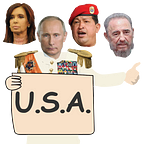Gerhard Schröder, Putin’s €250,000 pal
Among the surprisingly many members of the Western European political elite who’ve been remarkably steadfast in their, um, understanding for even the most brutal conduct by Vladimir Putin, one of the staunchest has been Gerhard Schröder, who served as chancellor of Germany from 1998 to 2005. Schröder, as it happens, sits on the board of Russia’s Gazprom, the giant government-owned natural-gas company, and is a longtime personal chum of the Kremlin thug (whom he’s called a “flawless democrat”). Putin once turned up at Schröder’s home in Hanover “with a Russian choir to celebrate his birthday.” Schröder has described Putin as having “a very close relationship to Germany” — noting that in the 1980s Putin was a KGB spy stationed in East Germany. (As we all know, of course, that’s the best way to develop a “very close relationship.”)
And what a friend Schröder has been! When Putin invaded Ukraine, Schröder was quick to defend his buddy: Putin, he argued, was simply trying to keep Russia strong and on par with the U.S. Who could criticize that worthy goal? Putin, Schröder further explained, was justly worried about “being encircled” — as if there were even the remotest possibility of a military incursion into Russia from Ukraine or Poland or one of the Baltic states. Schröder also made the point that Ukraine is “culturally divided,” with some Ukrainians identifying more with the West, others looking to Russia — so hey, why not let Putin seize some of the pro-Russian part of the country?
At least Schröder acknowledged that the invasion constituted a clear violation of international law — but he hastened to add that the 1999 NATO bombing of Serbia also violated international law. Never mind that Putin’s action was an aggressive, unprovoked land grab by a brutal dictator, and NATO’s bombing was a humanitarian effort to save the lives of people who were being targeted by a genocidal dictator.
Germany’s current chancellor, Angela Merkel, was outraged by Schröder’s support for Putin’s assault on Ukraine. Roland Nelles of Der Spiegel wasn’t impressed either. When Schröder celebrated his 70th birthday with Putin in April of last year — hot on the heels of the Crimea invasion — Nelles accused him of “making a mockery of Berlin’s foreign policy.” Yes, the two guys are pals. But still, wrote Nelles,
Schröder ought to know better. If the former German chancellor believes he can continue his friendship as if nothing has happened, it’s a mistake. Schröder’s own center-left Social Democratic Party is currently the junior coalition partner in Chancellor Angela Merkel’s government, which is frantically trying to prevent his friend Vladimir from carrying out the policies of a power-drunk hegemon in Eastern Europe. In difficult times like these, a former German leader should, at least publicly, keep a safe distance from Putin….as Germany’s former leader, he is still obliged to maintain a statesman-like responsibility for his country.
Thomas Holl of Frankfurter Allgemeine agreed. Reacting to photographs of Schröder hugging Putin, he called them “macabre.”
One interesting detail about that 70th birthday party. It was hosted by Nord Stream AG, a Gazprom subsidiary that operates a gas pipeline between Russia and Germany. Guess who’s the chairman of Nord Stream’s advisory board, raking in €250,000 a year from the Russian government? None other than Gerhard Schröder. In fact, he took the job only weeks after his party lost the 2005 parliamentary elections, forcing him to hand over the chancellorship to Merkel. “Opponents,” recalled Reuters, “said the haste with which he took up the job was unseemly and the link to Russian interests too direct for a former chancellor.” In any event, the fundamental fact about Schröder now seems clear. As Bundestag member Manuel Sarrazi puts it, he’s “spreading the Kremlin’s propaganda” and is “now a paid spokesman for Russia.”
